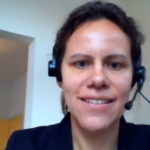
Srijakpat Chalermchai, Agriculture and Food Cluster
Thailand aims to promote climate-smart and sustainable rice farming practices for enhancing farmer’s ability to adapt themselves to more frequent droughts, while helping reducing gas emissions harmful to climate change.
Innovative finance partnership is needed for securing the future of sustainable rice cultivation in Thailand, rice experts say.
Up to 50 participants from government and international organisations and private sectors recently met during the virtual roundtable discussion on the topic “Financing Sustainable Rice in Thailand”.
Hosted by the Sustainable Rice Landscapes Initiative (SRLI) in collaboration with the Just Rural Transition, the World Business Council for Sustainable Development (WBCSD), Sustainable Rice Platform (SRP), Food and Agriculture Organization (FAO), United Nations Environment Programme (UNEP), International Rice Research Institute (IRRI) and the Deutsche Gesellschaft für Internationale Zusammenarbeit (GIZ) GmbH, the aim of the 2-hour forum is to bring together rice experts and stakeholders to share their views and insights on financing rice landscapes and identify innovative yet suitable solutions to pushing forward sustainable rice cultivation in Thailand and the region.

Nowadays, the agriculture sector in Thailand represents only 6.3% of the country’s gross domestic product (GDP) where the rice sector accounts for 13%. Among the current challenging issues, Thai Rice Department provides a budget for rice research and extension which is not only to meet consumer demand or food security concerns. There has also been responding to climate change through the risk reduction measures for rice cultivation in both the support of financial instruments and non-financial instruments. For example: subsidy for laser land levelling (LLL) cost and insurance premium, carbon credit and SRP product price support, structural investment, as well as the supporting activities and SRP standard rice promotion.
Dr. Apichart Pongsrihadulchai, Advisor to the Director, General Rice Department of Thailand, speaks on the topic of Climate Change and Rice Farming with a Focus on Financing Needs and the Climate Financing Infrastructure in Thailand.

The Thai government has been working for over a decade to introduce policies on tackling financing needs for improving infrastructure in the agricultural sector and supporting smallholders on efficient rice cultivation regarded as the country’s major crop.
In cooperation between the department and GIZ, Thai Rice (Nationally Appropriate Mitigation Action) NAMA projecthas accomplished in bringing transformational change to over 100,000 Thai farmers in six central provinces. Approximately 40% of them have so far could access low-interest rate financial support programme enabling them to invest in innovative agricultural technologies and equipment for LLL regarded as one of the key methods to help farmers increase rice farming productivity and efficiency.




